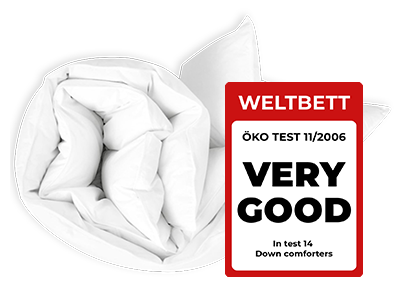Policy
Social welfare
Social welfare policy
1. Introduction
We adhere to the highest social standards in our facilities around the world and ensure that our partners do the same. We have therefore joined the Business Social Compliance Initiative and all our facilities and sites are independently audited to ensure that they comply with a fair code of conduct. Ironically, this commitment was not at the expense of price. We have found that a more stable and committed workforce promotes our quality and guarantees you a sustainable product and production.
2. Application range
The social policy applies to all our products, our internal production and logistics processes and the supply chain up to the source of our raw materials.
3. Commitment to socially acceptable standards
For all relevant private label products, WELTBETT (Weltbett GmbH) demands compliance with all legal regulations in the area of our social policy. Our code contains the following ten key elements of the Business Social Compliance Initiative BSCI to improve working environments:
- Freedom of association and the right to collective bargaining are respected
- Non-discrimination environment
- Child labour is prohibited.
- Statutory minimum wages and/or industry standards are paid
- Working hours comply with national laws and do not exceed 48 hours regular + 12 hours overtime
- No forced labour or disciplinary measures
- Safe and healthy workplace
- The environment is respected
- Policy on combating bribery and corruption
We are committed to these socially responsible standards at all stages of the supply chain.
WELTBETT Pursues the goal of actively maintaining its range of 100% socially responsible products, production and packaging that originate from production sites that demonstrably apply social standards that exceed legal requirements. In addition, our suppliers are obliged to comply with minimum social standards at all stages of the production chain, i.e. from the fattening farm to the processor to the shop (see Corporate Governance Principles / BSCI Code of Conduct). WELTBETT Is a member of the Business Social Compliance Initiative BEPI and promotes its standards and codes of conduct along the entire supply chain.
4. Requirements and implementation
We are actively committed to the observance of social standards and have already taken concrete measures to this end in the following areas, among others:
Social standards for customers
Our customers are among the strongest drivers and champions of industrial convergence in our industry towards acceptable social standards throughout the supply chain. We work with our customers to help them formulate their standards and objectives and monitor progress towards achieving them. We follow our highest customer standards.
Requirements on our products and raw materials
WELTBETT purchases products exclusively from manufacturers who meet all local and international social standards and/or are certified accordingly. This enables us to avoid the use of chain elements that contribute to socially, morally or ethically unacceptable behaviour.
Textile-related social issues
WELTBETT follows all textile-related social issues and topics and always strives to lead the way with the latest standards, tests and labels.
- We look at the conditions for workers in fabric production, from cotton farms to spinning, weaving, bleaching and dyeing, to the manufacture of finished products.
- We accept the SA8000 certification and its strict standards as proof of compliance with socially responsible standards in these environments.
- We require all our partners throughout the supply chain to comply with BSCI through direct membership or equivalent certification (such as SA8000).
Third party audits
- WELTBETT uses the following audited third party standards to monitor compliance with these guidelines:
- WELTBETT is a member of BSCI, directly and for all companies affiliated with it.
- WELTBETT accepts certification for its partners according to the Social Accountability International Standard SA8000.
- WELTBETT only recognizes certification bodies at CB audits that are listed by SAAS on its list of accredited certification bodies
No socially unacceptable products
We also reject products that do not meet our social policy standards throughout the supply chain. Not only will we strive not to use products or raw materials that do not meet the standard, but we will actively eliminate from our portfolio products or raw materials that do not meet our social policy.
We will also reject products or raw materials that do not meet our social policy standards throughout the supply chain.5. Active implementation
At WELTBETT we implement our social requirements in close cooperation with our suppliers. The implementation of our internal requirements is carried out by the purchasing departments with the support of the responsible corporate governance drivers. Specific requirements, goals and measures are also implemented in close cooperation. We monitor the implementation at our suppliers and carry out risk-oriented assessments. We reserve the right to have the requirements of our social policy checked by internal and/or external audits if necessary. In addition, we expect our suppliers to ensure that all employees who are responsible for dealing with personnel issues and who influence social standards are effectively trained to carry out routine practices in such a way that they comply with social standards and, if necessary, qualified to promote good standards of social conduct in their areas of responsibility. This Social Policy is part of our Terms and Conditions. In cases where violations of our policies are identified, suppliers must submit corrective action plans that clearly state how relevant violations can be resolved within a specified timeframe. The managing directors are regularly informed about the status of implementation.
We strive to continuously improve the products in our range and to maintain our portfolio at a high and 100% socially responsible level. In this context, we always consider the wishes of our customers and the market environment. The transition to more socially responsible alternatives includes the following:
- Extension of the range of certified BSCI-compatible products,
- Expansion of the range of certified SA8000-compatible products,
- Implementation of pilot projects to promote high social standards.
- Improving social conditions for conventional products in cooperation with our suppliers.
As we want to offer more socially compatible products, an exchange with external partners is essential. We are therefore in close contact with NGOs, representatives of the scientific community and stakeholders.
Pilot projects and measures
WELTBETT actively implements social standards throughout our supply chain when opportunities arise. Here are some pilot projects that Weltbett GmbH has already implemented today:
- Works council in our German factory, in accordance with the high German social standards
- Workers association in our factory in China, in accordance with the highest Chinese social standards
- Membership of WELTBETT and its affiliated companies in the Business Social Compliance Initiative BSCI
- Membership of all suppliers in the BSCI or their certification according to SA8000
- Through our commitment to the N-Club (a German sustainability club), we have partnered with the Elbe Werkstätten, a non-profit organization for people with disabilities, and have now made the wooden frames of our beds undergo rigorous quality testing, which we apply to all our products.
We undertake to maintain these measures, to extend them and to add further measures as they become available.
Regular evaluations
We are committed not only to meet these standards, but to exceed them measurably and clearly. To this end, each of our plants is regularly and unannounced audited by BSCI. In addition, the current social policy is evaluated every year and adjusted if necessary. This is the only way to ensure socially responsible behaviour throughout the supply chain in the long term. We also formulate goals and evaluate the extent to which these goals have been achieved on an annual basis.
 en
en 
 The Duvet
The Duvet
 The Topper
The Topper
 The Pillow
The Pillow
 The Footer
The Footer